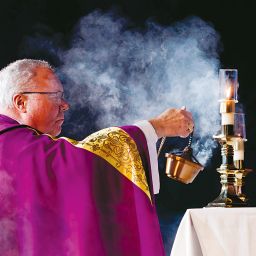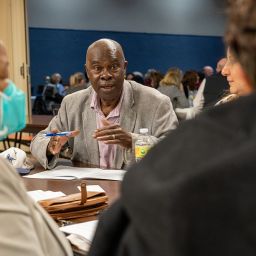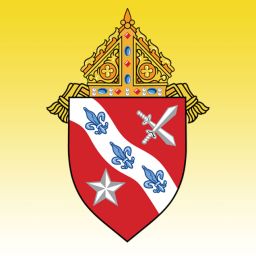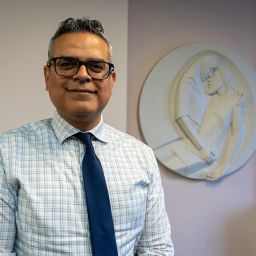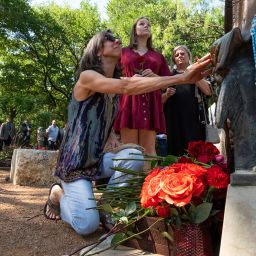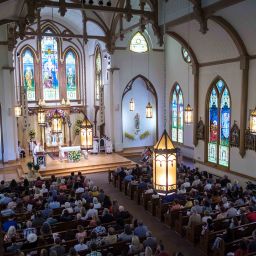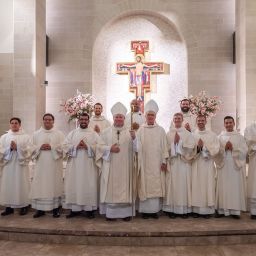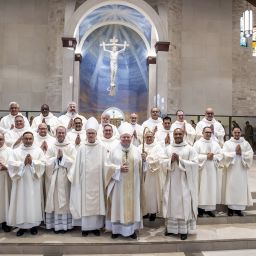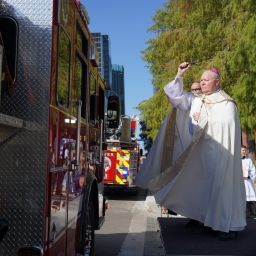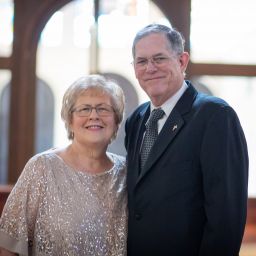
By Michael Gresham
The Texas Catholic
Answering the call to serve and protect their communities, police officers often live courageous and challenging lives. For those who wear the badge, the toll of such work can be heavy, leaving them physically, mentally, and spiritually exhausted.
This fall, at the request of Bishop Edward J. Burns, the Diocese of Dallas initiated a new ministry aimed at providing some spiritual backup for Dallas police officers, welcoming its first two volunteer police chaplains, Father Jacob Dankasa and Deacon Manny Rendon.
“This ministry is a bishop’s response to a need in the Dallas Police Department,” said Juan Rendon, D. Min., diocesan director of Catholic Social Ministries, who added that the diocese’s participation is to assist the local law enforcement with pastoral care for those who wear the badge. “DPD is fully invested in helping in the faith life of its members.”
Rendon sees participation in the volunteer police chaplain ministry as a way for the diocese to put faith into action through its Catholic social ministry by responding to spiritual care needs of officers and their families.
“Our bishop, through his chaplains, is providing sacramental and pastoral care to members of the police department and their families,” Rendon explained. “We are a Church that walks with those entrusted to protect us and maintain law and order in times of joy and times of sorrow. Our chaplains will be part of an ecumenical team of chaplains, and we hope to work together for the common good and the protection of all human life.”
Spiritual support
Father Dankasa said that when Bishop Burns reached out to him about volunteering as a police chaplain for the Dallas Police Department, he saw it as a way to build upon the work he does at his parish.
“I saw it as an extension of my parish and the Catholic officers as part of my parishioners,” said Father Dankasa, pastor of Holy Family of Nazareth Catholic Parish in Irving. “I provide pastoral and spiritual presence and support to my parishioners; and the way I view the DPD volunteer chaplain assignment is that the officers are now part of these parishioners, regardless of where they live.”

Likewise, Deacon Rendon felt offering support to those in need embodied the spirit of his diaconate ministry.
“When Bishop Burns invited me and explained to me the need to provide spiritual, faith-filled support when there is a fallen officer, to support the family in those moments when the person is most vulnerable, I felt the call to contribute with the help of the Lord,” said Deacon Rendon, who was ordained a permanent deacon in May 2022, serving the parish community at St. Ann in Coppell.
According to Father Dankasa, as a volunteer chaplain, his duties mostly concern ministering to and providing spiritual support to the police officers — including reserve and retired officers — and their families at moments of need.
“Basically, as a priest, I will support their spiritual, physical and psychological needs,” he explained. “When officers or members of their families are injured, ill, or are suffering from grief, as a volunteer police chaplain, I’ll visit them at those critical moments and help them resolve their crisis, where possible, or help them to learn to carry their cross as Our Lord did.”
Deacon Rendon said the role of a police chaplain is rooted in Catholic social ministry through consoling those in the need for prayer, sharing the Gospel, and offering sacraments.
“It will be a new but beautiful experience,” Deacon Rendon said. “I am completely sure that, personally, it will help me grow as a person and, therefore, I will be able to contribute with the help of God and with humility to the Church an adequate evangelization so that people feel the love and mercy of God.”
A blessing for others
A vital part of the role also includes creating bonds of support, community, and brotherly love, Deacon Rendon explained.
“Regardless of the faith that each person professes, it is important to know that we are created in the image and likeness of God; therefore, there is no distinction whatsoever regarding the dignity of each person, regardless of color, language, or race,” he said. “The important thing is to know that you are loved by the Creator and to love your neighbor and help each other.”
Other responsibilities include participating in public ceremonies of a spiritual nature for both police and city departments when requested.
“The fun part is that occasionally I can ride with an officer in the squad car so that we as chaplains can get to know them well and they too get to know us,” Father Dankasa said.
Father Dankasa said he believes the volunteer chaplaincy program adds another layer to his priestly ministry.
“As pastors, we receive and respond to emergency calls for the sick or the dying all the time. I see this as an extension of that,” he said. “For example, our police officers are often in harm’s way. If someone is injured or at the point of death, I’ll be called to offer the sacrament of the Anointing of the Sick and last rites, if necessary. When an officer dies, I’ll be present to celebrate the funeral and to console the family. This is already part of our ministry as Catholic priests in the Catholic Church.”
On average, serving as a volunteer police chaplain is a commitment of about six hours a month, though it can be more if the need arises. No matter how many hours he spends serving that ministry, Father Dankasa said it is time well spent.
“With the considerable pressure that our police officers find themselves facing, I think it’s very wise that both the Dallas Police Department and the Diocese of Dallas felt the need to provide them with spiritual support,” he said. “I’m sure there are secular counselors that officers can consult in moments of crisis. But having a spiritual guide, such as clergy in addition, is very soothing.”
The Irving priest said the diocese is participating in this volunteer police chaplaincy program because the bishop understands the spiritual benefits that Catholic police officers, in particular, will gain from knowing that the sacraments are always available to them, especially the sacraments of healing.
“For us as Catholics, having the opportunity to release all your heart through the sacrament of penance or confessions, to be able to feel that one is again reconciled with God, brings so much peace,” Father Dankasa said. “I feel the sacrament of penance is one of the most confidential conversations that one can ever have.
“Giving our police officers that opportunity is a blessing.”

